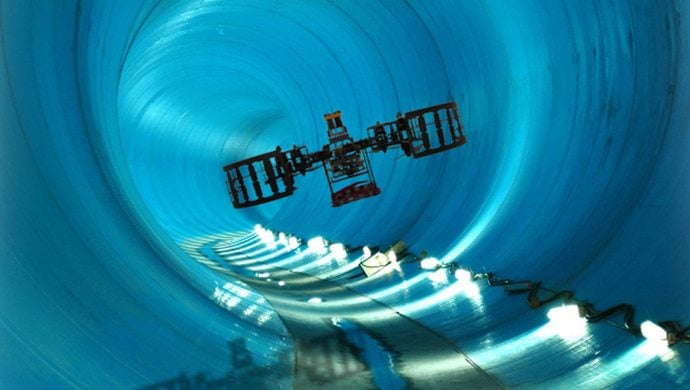This Singapore-based startup spent years in the lab to develop a drone that can go underground. Now, they’re ready to take their tech out to the world.

The earliest form of unmanned aerial vehicle, or UAVs, had been in use since 1849, when Austrians sent balloons carrying explosives to Venice. Crude as it were, some balloons successfully managed to reach Venice and bomb the Republic, marking the first instance that unmanned devices are able to take flight and perform activities that typically require human action. Over a hundred years and several wars later, UAVs have evolved not only in technology but in how they are used.
In recent decades, UAVs have been used to gather data from high-risk areas and situations and, in the past few years, have enjoyed increasing commercial popularity with their use in aerial photography. It is this data-gathering function that AeroLion wants to utilise for more than just open air conditions.
AeroLion CEO Wang Fei developed an interest in drones after seeing an unmanned helicopter in the National University of Singapore (NUS). After putting together a team, they worked at the Temasek Labs in NUS to develop new technology for drones. Focusing on indoor flying, the AeroLion team worked on developing GPS-less UAVs.
“When we started, UAVs are limited to open airspace. We wanted to make something that could solve complicated problems in complicated environments,” Wang Fei stated. These complicated environments include tunnel inspections, indoor warehouse surveillance,high-altitude facilities checks in adverse conditions, and other activities that could be dangerous and intensive for human labour. The idea is to minimize human risk while increasing accuracy and efficiency of tasks through enhanced imaging and data gathering.
Also read: This Singapore startup wants to roll out autonomous drones to shake up how warehouses operate
The company developed the BlackLion 168 UAS. A product of years of research, the BlackLion 168 is an unmanned aerial system (UAS) platform that relies on multi-sensors to conduct inspection and surveillance activities. This means that it can navigate through challenging environments such as underground tunnels with flight accuracy and has the capability of building its map real-time without the need to know its environment beforehand. With this product, AeroLion has solved two pressing problems: GPS-less environments and navigation through unknown environments.
We wanted to make something that could solve complicated problems in complicated environments
Today, with different variations of the BlackLion, the company has worked with several Singapore government agencies and has ventured out to China. But it had not been an easy journey for AeroLion; mainly, having no one in the team with a business background has proven to be a challenge for the company to bring their technology to the market. “We all had R&D backgrounds. No sales person, no HR, no Finance,” Wang Fei says. Their group of PhD holders knew that to bring their tech out to the world, they will need help.
Also read: Roadmap to success: The importance of well-defined internal policies and processes from day zero
One of the things that AeroLion did was to join the Accreditation programme of the Info-Communications Media Development Authority (IMDA) of Singapore. The extensive evaluation process the company underwent, says Wang Fei, gave them the opportunity to dive deeper into the business aspects of the operation. “The programme helped us in all aspects – technical, business, finance. Accreditation@IMDA (A@IMDA) helped us refine our business model and be more clear about the market we are after. We were also able to developed a structured finance and accounting system.”
Under the guidance of A@IMDA, AeroLion was also able to identify new business opportunities; their engagement exposed the company to various government agencies that resulted in discussions on the solutions that AeroLion can deliver to address these agencies’ pain points.
It was through A@IMDA that the company was able to engage in a project with the Singapore Land Authority to automate drones in locating building defects, illegal dumping, and environmental issues such as ponding in State land and properties. AeroLion was also introduced to the Public Utilities Board through A@IMDA, wherein the company developed and deployed the BlackLion UAS to inspect the deep tunnel sewage system for cracks or abnormal objects, with some tunnels stretching more than 5 kilometres in length.
Also read: 27 startups that kick ass
Asked what’s next for AeroLion, Wang Fei states that apart from refining the technology for a more accurate GPS-less navigation, the company is also looking towards expansion to other Asian countries. “A@IMDA has helped us in the expansion by assisting in giving the necessary contacts as well as helping us form new ideas.” Through the programme, AeroLion was able to not only gain introduction to relevant organisations and government agencies but also implement ideas on how to leverage on product development to gain customers.
What began with Wang Fei’s interest in drones grew into a team sharing the same vision of producing world-class unmanned aerial devices that could help humans address high-risk activities. As Wang Fei said, “AeroLion UAVs are small, but the problems it can solve are big.”
__
Disclosure: this article was produced by the e27 content marketing team, sponsored by Accreditation@IMDA. The views and opinions expressed in this article are those of the authors and do not necessarily reflect the position of Accreditation@IMDA.
Feature image credit: AeroLion website
The post Out of the lab to the world: AeroLion goes from researching drones to solving real-world problems appeared first on e27.